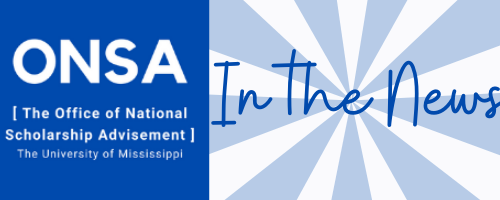
The Office of National Scholarship Advisement (ONSA) supports and advises students applying for a select number of competitive national and international merit-based awards.
These awards offer life changing opportunities where academic excellence, leadership and active communal engagement are valued and nurtured. This is not just a gateway to undergraduate and graduate school funding, but an opportunity to further your mind, commit to bettering our world and actively engage in a scholarship community.
WHAT TO EXPECT:
Plan on the equivalent of a 3-credit course, about 30-50 hours of work to go into your applications. You will:
- Reflect on your background and aims
- Explore matches with major scholarships
- Devise educational/professional strategy (both with and without a major scholarship in the picture)
- Research possible programs of study or projects to propose
- Discuss plans with mentors, faculty, and advisors
- Request letters of recommendation and transcripts in a timely manner
- Write, revise, rewrite, revise your responses to applications.
- Speak to ONSA mentors
- Revisit your application and revise again!
- Submit the complete application by the Campus Deadline
- Prepare for the Nomination Review
If you are nominated by ONSA, you will:
- Refine the final application packet
- Upload and check all digital material to scholarship portals
- If invited to Finalist interview, participate in mock interviews to prepare
How ONSA will assist you in your application:
- Information source
- Information on the scholarships; procedures and timelines
- Assistance and hard questions to help you determine eligibility, fit and competitiveness
- Tutor
- Review of drafts (if allowed by award), suggestions for revisions, reminders of program expectations, preparation for interviews
- Facilitator
- Guidance for letter-writers; oversight of application as a whole; reminders of internal deadlines and required materials
- Coordinator
- Receipt of material for Campus Deadline; distribution of nomination committees; coordination of nomination interviews
In addition, ONSA will:
- Oversee writing the University letter of endorsement (if required)
- Monitor completion of all parts of the application (Letters, transcripts, etc.)
- Submit completed applications to program, if program requires
- Co-ordinate mock interviews
Quick Overview of Application Processes:
- Completing these applications will require research:
- The UK Scholarships stress the need-to-know what program and degree suit the applicant’s background and goals
- Truman, Goldwater and Udall have similar expectations
- The Fulbright application requires a project that suits the country and the applicant’s background and is doable in the timeframe- this takes reflection and research.
- Fit: What is the candidate profile of the scholarship you are applying for?
- The level of leadership and/or achievement in the field expected by most scholarships is exceptional high. Do you have demonstrable impact in your field/community already? –Truman, Rhodes, Marshall, Goldwater, NSF GRFP
- Do you have teaching experience, an interest in cultural exchange? Fulbright ETA
- Independent work- for instance accomplished through a thesis, research project, internship, the creation and initiation of some community program—is the best evidence of genuine interest, capability, and/or leadership skills. If the record of achievement is almost solely summed up by successful classroom experiences the applicant will not be a strong contender in most of these competitions.
- GPA: For some, but not all scholarships, applicants need a high GPA of 3.8 at minimum
- University nomination is often required. Applicants must contact ONSA far ahead of the campus deadline to discuss candidacy. Applicants will submit a completed application to ONSA. A university campus committee will review the applications, interview candidates and may or may not nominate them. Many programs limit the number of students who may be nominated.


